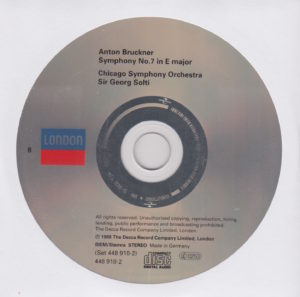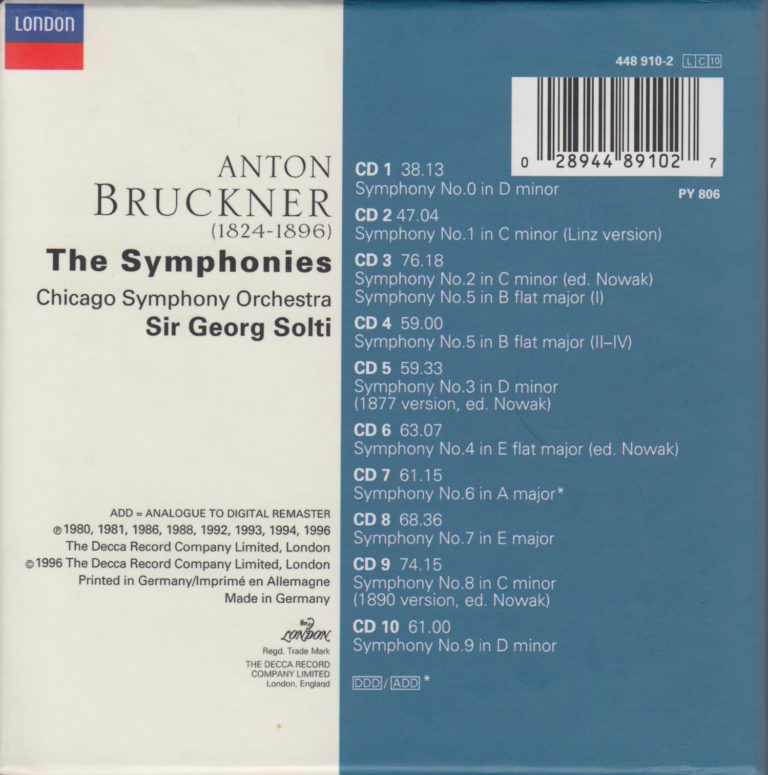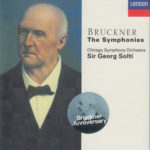 This morning’s conductor of Anton Bruckner’s Symphony No. 7 in E Major (WAB 107) is Hungarian-born Sir Georg Solti (1912-1997), an artist with a long and noteworthy career.
This morning’s conductor of Anton Bruckner’s Symphony No. 7 in E Major (WAB 107) is Hungarian-born Sir Georg Solti (1912-1997), an artist with a long and noteworthy career.
His orchestra for this box set is equally revered: the Chicago Symphony Orchestra.
On a side note, I used to work with a guy who was nuts about the CSO. He could (and, usually, did) tell me its history, especially regarding its horn section. He could (and, usually, did) tell me the history, make, and model of each type of horn. He could (and, usually, did) tell me about who such and such a musician used to play for. He could (and, usually, did) tell me everything was doing, who he was talking to, whether it was raining or not at any given time of day stretching back to the mid 1960s. If ever there was a real Rain Man-type guy, my friend qualified.
He was a veritable fount of esoteric musical lore.
I miss him.
Anyway…
I first heard Sir Georg Solti on Day 14 of my 144-day journey, Symphony No. 1.
Then again on Day 30, Symphony No. 2.
Then again Day 46, Symphony No. 3.
Then again on Day 62, Symphony No. 4.
Then again on Day 78, Symphony No. 5.
And, most recently, on Day 94, Symphony No. 6.
In my previous assessments of Solti’s works, I pointed out the lack of information in the CD booklet – including the name of the record label and the versions/editors used for each symphony. It’s a relatively thick booklet. But what it doesn’t contain is glaring.
The other day, I happened to look at the back of the box and noticed this:

So, although I discovered a source in this Solti box set for some information regarding version and editor, I’m still not happy with this because:
1. None of this edition/editor information is in the CD booklet or on the disc itself, plus
2. The information listed is incomplete. No version listed for Symphonies No. 0, No. 1, No 2, No. 5, No. 6, No. 4, No. 7, and No. 9. Sometimes, an editor is listed. Sometimes, a version is listed. But I know enough about Bruckner to know that what Decca printed on the back of the CD box leaves a lot to be desired. As least, I desire more. (At least a little more.)
 Okay, now on to the objective aspects of this recording:
Okay, now on to the objective aspects of this recording:
Bruckner’s Symphony No. 7 in E Major (WAB 107) composed between 1881 and 1883
Sir Georg Solti conducts
Solti used the ??? version, edited by ???
Chicago Symphony Orchestra plays
The symphony clocks in at 68:36
This was recorded in October of 1986 at Medinah Temple, Chicago
Solti was 74 when he conducted it
Bruckner was 59 when he finished composing it
This recording was released on the London/Decca label
Bruckner wrote his symphonies in four parts. The time breakdown from this particular symphony (Symphony No. 7 in E Major (WAB 107), from this particular conductor (Sir Georg Solti ) and this particular orchestra (Chicago Symphony Orchestra) is as follows:
I. Allegro moderato…………………………………………………………………………21:27
II. Adagio. Sehr feierlich und sehr langsam…………………………………..25:12
III. Scherzo. Sehr schnell…………………………………………………………………10:10
IV. Finale. Bewegt, doch nicht schnell……………………………………………11:45
Total running time: 68:36
Okay when you put all this together, what do you get?
My Rating:
Recording quality: 4
Overall musicianship: 5
CD liner notes: 4 (lengthy essays, but incomplete recording/version information)
How does this make me feel: 5
As I’ve noted before, the Chicago Symphony Orchestra can, at times – at least, to my ears – sound a bit piercing in the horn section. That’s not the case in these recordings. Everything is kept just below the brassy level.
I listened to this performance twice through before I started to write about it.
Each time, I was engrossed. Hooked.
I can’t even explain why.
And that despite a slight dip in the quality of the recording over the last performance…and lengthy interpretation…and the lack of adequate information in the liner notes.
Given Sir Georg Solti’s reputation as being the conductor for what’s noted as “The Greatest Recording Of All Time!” (His interpretation of Richard Wagner’s Der Ring Des Nibelungen), I expected a blow-out performance of the Wagner-like Adagio.
I got it. It was stirring.
There wasn’t a single thing I disliked about this performance.
For that, I grant Solti’s interpretation of Bruckner’s Seventh a resounding…
“Huzzah!”
